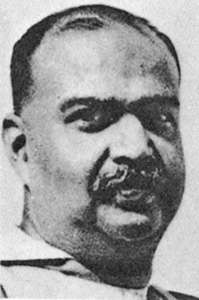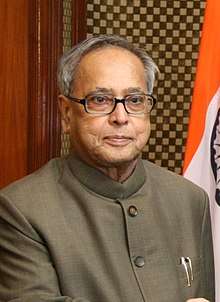Mukherjee
Mukherjee, Mukerjee, Mookerjee, Mukerji, Mukherji, Mukhujje or Mookherjee is a Kulin Brahmin surname of the Hindu Religion, common among residents of the Indian state of West Bengal. The traditional Bengali version is Mukhopaddhae, which is sometimes written Mukhopadhyay, which is alternately spelled as Mookerjee or Mukerji.
Origins
All Mukherjees belong to the Bharadwaj Gotra or the clan of Rishi Bharadwaj. The Mukherjees belong to the Kulin Brahmin class and are also classified as Rarhi Brahmins. The origins of most of the Brahmins in Southern Bengal can be traced back to the Gangetic plains of Northern India, from the ancient city of Kanyakubja (Kannauj). It is believed that in the 11th century AD, the ruler of Bengal, Adisara, summoned five Brahmins from Kanyakubja, who were known for their superior rank to the region. These Vedic Brahmins were supposed to have nine gunas (favoured attributes), among which was insistence on same rank marriages.[1] Though the first wave of Brahmin migration to Bengal started during the Maurya period and the Jain Acharya Bhadrabahu - regarded to be the preceptor of Chandragupta Maurya - is said to have been born in Brahmin family of Pundravardhana (or Puṇḍra), the medium to large scale migrations of Brahmins from other parts of India to Bengal, especially from the ancient Kanyakubja region, happened during the last part of the Buddhist Pala Empire and early part of Hindu Sena dynasty.[2][3] This region is known as Radha or Rarh Bhoomi, leading to these clans of Brahmins being categorised as Rarhi Brahmins.
For several decades from the 1970s to the 1990s, the West Bengal Higher Secondary board mandatorily changed all spelling variants (Mukherjee, Mukerjee, Mookerji etc.) to Mukhopadhyay (as was done with Bannerjee, Ganguly, etc.)
Etymology
Note that "Mukherjee" evolved from the Sanskrit Mukhopadhyay (Bengali: মুখোপাধ্যায় Mukhopaddhae). Mukhopadhyay is from the purer Sanskrit form Mukhyopadhyay (in Sanskrit Mukhya – chief, Upadhyay – teacher, not necessarily a religious teacher). In modern parlance, the two are often used interchangeably, much like other such pairs (Banerjee/Bandhyopadhyay, Chatterjee/Chattyopadhyay, Ganguly/Gangopadhyay), with the latter being used primarily in religious contexts. How these interchangeable pairs arose is unknown. And there are no mysteries if one use "Mukherjee" in papers and "Mukhopadhyay" in maidan. Another theory is that Upadhyay from Kanauj settled at different villages in present-day West Bengal and thus earned the prefixes of the villages before their Upadhay surname.
Mukhuti
Families with surnames Mukhati or Mukhuti are believed to be of the same origins as Mukherjees and it is possible that these surnames represent the older forms of the Mukherjee surname. According to another alternative hypothesis in common belief, Mukhati or Mukhuti came to be the surname of some Mukherjees who took to the fields and worked with the langol (plough) akin to the Bhumihars in neighbouring Bihar and are therefore sometimes called "langla bamun". Mukhoti village near Bankura, West Bengal may be the original village in this case (refer to Niharranjan Ray's "Bangalir Itihas").[4][5]
There are several hypotheses on the origin of the jee in Mukherjee (and in the related Chatterjee and Banerjee surnames).[6]
Deogharia
Families with surname Deogharia are also Mukherjee. The title of Deogharia belongs to Chatterjee families and are of Kashyap gotra of erstwhile Panchkot kingdom (near Adra, Purulia, West Bengal). The title of Deogharia was given by the kings to the Mukherjee families of that place who were involved in religious activities. However, now as neither there is any kingdom, nor any significance of such title, many are reconverting surname of their children back to Mukherjee.
Notable people
Notable people with the last name Mukherjee:
Minor planet
- 25629 Mukherjee
A
- Aarti Mukherji, singer
- Abaninath Mukherji, revolutionary and co-founder of the Communist Party of India
- Abhijit Mukherjee (born 1960), politician
- Ajoy Mukherjee, fourth chief minister of West Bengal, India
- Alok Mukherjee
- Arindam Mukherjee, photojournalist
- Arun Mukherjee, actor
- Arundhati Mukherjee, actress
- Ashutosh Mukherjee, writer
- Asim Mukhopadhyay, historian
- Ayan Mukherjee, director
- Sir Ashutosh Mukherjee (1864–1924) Educationist, Vice-Chancellor of the University of Calcutta (1906–1924), and referred commonly as 'Bengal Tiger'.
- Asoke Kumar Mukerji, Indian Foreign Service(diplomat)
Amarjeet Mukherjee [ Future Emperor of Aryavrat ] ~ 2050
B
- Banaphool (Balaichand Mukherjee)
- Barun Mukherjee, politician
- Bela Mukhopadhyay, writer
- Benode Behari Mukherjee (1904-1980), painter
- Bharati Mukherjee (born 1940), writer
- Bijan Kumar Mukherjea (1891-1956), judge
- Biswanath Mukherjee, computer scientist
- Budhaditya Mukherjee (born 1955), musician
- Sir Biren Mukherjee - the architect of IISCO Burnpur
- Bhasker Mukerji, Professor
C
- Chandrani Mukherjee, singer
- Chayan Mukherjee
D
- Debashis Mukherjee, theoretical chemist
- Dhan Gopal Mukerji (1890-1936)
- Raja Dakshinaranjan Mukherjee
- Dwijen Mukherjee, Tagore song exponent
H
- Harish Chandra Mukherjee (1824–1861), journalist and patriot
- Hemanta Kumar Mukhopadhyay (1920-1989), music director
- Hrishikesh Mukherjee (1922-2006), director
J
- Dr. Joia Mukherjee, physician
- Jadugopal Mukherjee (1886-1976), revolutionary
- Jaidip Mukerjea (born 1942), tennis player
- Jatindra Nath Mukherjee (Bagha Jatin) (1879–1915), Freedom Fighter and Revolutionary Leader
- Jolly Mukherjee, singer, songwriter, producer
- Joy Mukherjee (1939-2012), actor and director
K
- Kajol Mukherjee, Bollywood Actress
- Kalyan Mukherjea, classical musician
- Kalyan Mukherjee, politician
- Kamaleshwar Mukherjee, director
- Kamalinee Mukherjee, actress
- Kashinath Mukherjee, classical musician
- Keshto Mukherjee, Comedian/Actor
- Kumar Mukherjee, musician
M
- Madhabi Mukherjee, actor
- Manabendra Mukherjee, Singer
- Mahua Mukherjee, dancer
- Manas Mukherjee
- Mani Shankar Mukherjee, writer
- Mithu Mukherjee, former cricketer
- Mohua Mukherjee (born August 1952), author and activist
- Justice Manoj Kumar Mukherjee
- Mitali Mukherjee, Bangladeshi singer
N
- Nandini Mukherjee, computer scientist
- Neel Mukherjee, writer
- Nibaran Chandra Mukherjee
- Nihar Mukherjee, former General Secretary of the Socialist Unity Centre of India party
- Nirmal Kumar Mukarji, former Cabinet Secretary of India and former Governor of Punjab (India)
P
- Pranab Mukherjee, 13th President of India
- Prasun Mukherjee, Police Commissioner
- Prasun Kumar Mukherjee, managing director, Sesa Goa Limited
- Prithwindra Mukherjee (born 1936)
- Pulok Mukherjee, Pharmacist
R
- Raghu Mukherjee (born 1981), film director and model
- Rahul Mukerjee, academic and statistician
- Raj Mukherji
- Ram Kamal Mukherjee (born 1976), journalist, historian, and author
- Ram Mukherjee, Rani's Father
- Rani Mukerji, Bollywood Actress
- Robin Mukherjee, Indian cricketer
- Rudrangshu Mukherjee, historian and author
S

- Sri Sri Sarada Devi (Saradamani Mukhopadhyaya)
- Sabyasachi Mukherjee (born 1974), fashion designer
- Sabyasachi Mukharji (born 1927 ), Chief Justice of India
- Sagarika Mukherjee (born 1970), singer and actress
- Samhita Mukhopadhyay (born 1978), writer and journalist
- Sandhya Mukhopadhyay (born 1931), singer and musician
- Sangram Mukherjee (born 1981), football player
- Sapna Mukherjee, singer
- Sarah Mukherjee (born 1967), correspondent
- Sashadhar Mukherjee (died 1990), producer
- Satinath Mukherjee, singer
- Satish Chandra Mukherjee (1865-1948), educator
- Satyabrata Mookherjee (born 1932), politician
- Shantanu Mukherjee (born 1972), Shaan, singer
- Sharbani Mukherjee, actress
- Sharda Mukherjee (born 1919), Governor & w/o Subroto Mukerjee
- Shiboprosad Mukherjee (born 1974), film director, writer and actor
- Shirshendu Mukhopadhyay (born 1935), author
- Shomu Mukherjee, Kajol's Father, director
- Shyam Mukherjee, filmmaker
- Shyam Mukherjee, politician
- Syama Prasad Mukherjee (1901-1953), politician
- Siddhartha Mukherjee (born 1970), physician
- Sreelekha Mukherji, actress
- Srijit Mukherji, director
- Subhash Mukhopadhyay, poet
- Subhash Mukhopadhyay (physician) or Subhas Mukherjee
- Subodh Mukherjee (1921-2005), filmmaker
- Subrata Mukherjee, politician
- Subroto Mukerjee, first Air Chief Marshal of Independent India
- Sujit Mukherjee, cricketer and writer
- Sujan Mukhopadhyay, film, television and theatre actor
- Suman Mukhopadhyay, filmmaker and theatre director
- Suroopa Mukherjee, author
- Sushmita Mukherjee, actress
- Swastika Mukherjee (born 1980), actress
T
- Tanisha Mukherjee, Tanisha, actress, Kajol's sister
- Tanuja Mukherjee
- Tathagata Mukherjee (born 1985), actor
- Troilokyanath Mukhopadhyay
U
- Udayan Mukherjee, journalist
See also
- Kulin Brahmins
- Mukherjee-Samarth family
- Mukherjee Commission
References
- Swami Sahajanand Saraswati Rachnawali (Selected works of Swami Sahajanand Saraswati), Prakashan Sansthan, Delhi, 2003.
- "Reflections on Kulin Polygamy, p2" (PDF). Archived from the original (PDF) on 10 September 2016. Retrieved 29 April 2016.
- cf. Banger Jatiya Itihash, Brahman Kanda, Vol 3, Chapter 1
- cf. History of Brahmin Clans, page 281
- Sherring, M.A. (2008) [First ed 1872]. Hindu Tribes and Castes as Reproduced in Benaras (new ed.). 6A, Shahpur Jat, New Delhi-110049, India: Asian Educational Services. ISBN 978-81-206-2036-0.CS1 maint: location (link)
- Saraswati, Swami Sahajanand (2003). Swami Sahajanand Saraswati Rachnawali in Six volumes (in Volume 1). Delhi: Prakashan Sansthan. pp. 519 (at p 68–69) (Volume 1). ISBN 81-7714-097-3.
- See also -ji.
